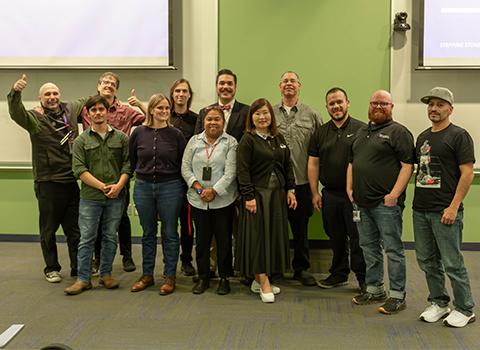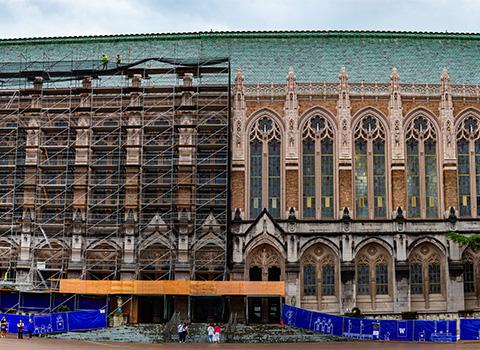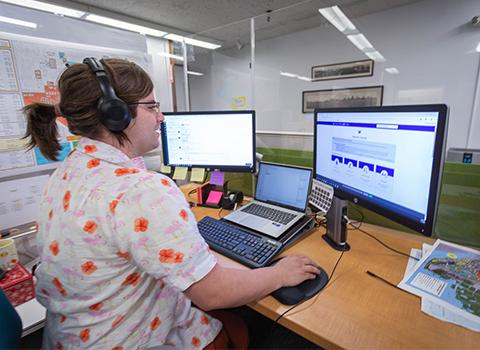Expansion plan is complete

UW Recycling (of the Building Services Department) met its goal of expanding the MiniMax program one month ahead of its ambitious December 2018 deadline. As of this November, the waste sorting program is now fully operating in 157 academic and facilities buildings on the University of Washington’s campus in Seattle.
Collaboration and communication were key in meeting this goal. It all started in October 2017, when UW Central Administration announced its support of MiniMax by mandating the implementation of the program in 57 buildings on campus.
Two fixed duration project assistants were hired and joined UW Recycling’s student assistant, creating a team of three working solely on the 2018 MiniMax expansion. “Recruiting and training new staff that could work well together while collectively planning, coordinating and implementing a complex project was a major priority for our department,” said UW Recycling Manager Liz Gignilliat.
The total infrastructure improvements of the MiniMax expansion breaks down to:
3,175 deskside MiniMax bins
696 individual public area bins with new lightweight, easy to clean lids and instructional landfill/recycling/compost labels
232 hallway public area bins for compost
232 hallway public area bins for recycling
468 compost bins in kitchens and other eating areas
844 recycling bins in common areas such as office suites and conference rooms
382 restrooms conversions to paper towel composting
All about teamwork
All about teamwork
“It was amazing to see the MiniMax team juggle so many moving parts,” said UW Recycling Program Support Supervisor Erica Bartlett. “Not only were they overseeing the project management details for the buildings they were individually assigned, but they were simultaneously working together to ensure the entire project moved forward at the right pace,” said Bartlett.
Something of this scale does not come without its challenges. “We had to rethink everything to make the expansion plan work,” said UW Recycling Manager Liz Gignilliat. “To remain cost effective and even more efficient than we've been during this process, we had to find temporary storage across campus and rely on assistance from other UW Facilities teams—including UW Custodial Services, UW Facilities Stores and UW Moving,” said Gignilliat.
“We also strived to stay under budget when purchasing new inventory,” said Bartlett. “The turnaround time for deliveries varies greatly, so inventory management was a constant discussion point throughout the year,” said Bartlett.

Left: Todd Carey (left) of UW Recycling collaborates with Roman Ariri (center) and Serafin Divina (right) of Custodial Services during an install in Miller Hall. Right: An example of off-site inventory storage space near the Health Sciences Building.
Real results
Real results
All 57 newly converted buildings are cleaned by Building Services Department custodians. Now that over 3,175 deskside MiniMax containers have been distributed, the same number of plastic bag liners from private offices are no longer discarded on a daily basis.
Additionally, since it isn’t necessary for custodians to check thousands of office bins, approximately 42.3 hours are collectively redirected every day to essential cleaning tasks (such as addressing high-traffic areas like restrooms and entryways).
Tangible results rolled in almost immediately. For example, weeks after the install in the Health Sciences Building (HSB), UW Recycling team members were struck by how quickly the program altered the building’s waste generation.
By November 2018, UW Recycling determined a 25% reduction in the amount of garbage generated in the six months following HSB’s MiniMax conversion in June 2018. That means 68 tons of HSB’s materials have been kept out of the landfill during that time.
Looking ahead
Looking ahead
“It feels so good to finally confirm that all academic and facilities buildings on campus are participating in MiniMax,” said Bartlett. “It’s been a long time in the making since the program initially started as a pilot in 2008. I’m excited to see the full impact this program will continue to have on UW’s waste diversion and waste reduction rates.”



